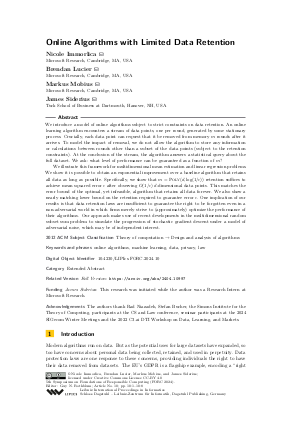@InProceedings{immorlica_et_al:LIPIcs.FORC.2024.10,
author = {Immorlica, Nicole and Lucier, Brendan and Mobius, Markus and Siderius, James},
title = {{Online Algorithms with Limited Data Retention}},
booktitle = {5th Symposium on Foundations of Responsible Computing (FORC 2024)},
pages = {10:1--10:8},
series = {Leibniz International Proceedings in Informatics (LIPIcs)},
ISBN = {978-3-95977-319-5},
ISSN = {1868-8969},
year = {2024},
volume = {295},
editor = {Rothblum, Guy N.},
publisher = {Schloss Dagstuhl -- Leibniz-Zentrum f{\"u}r Informatik},
address = {Dagstuhl, Germany},
URL = {https://drops.dagstuhl.de/entities/document/10.4230/LIPIcs.FORC.2024.10},
URN = {urn:nbn:de:0030-drops-200937},
doi = {10.4230/LIPIcs.FORC.2024.10},
annote = {Keywords: online algorithms, machine learning, data, privacy, law}
}

 Creative Commons Attribution 4.0 International license
Creative Commons Attribution 4.0 International license





















